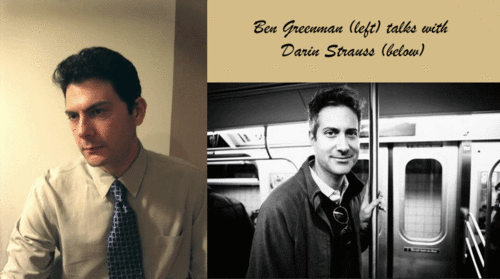
Darin Strauss and Ben Greenman live in Brooklyn. Both have written large amounts of published fiction: Strauss’s most recent book is a memoir, the National Book Critics’ Circle Award-winning Half a Life. Greenman’s new novel, The Slippage (Harper Perennial), comes out in May, and on its occasion, the two men sat down to discuss novel-writing, as well as writing that doesn’t result in novels.
DARIN STRAUSS: Your new book is about a suburban couple and their marriage. It’s a departure for you, in some ways, and it reads like modern Cheever, at first—it’s that realistic and precise. Then slowly you add more and more helpings of DeLillo. You haven’t written exactly this kind of conventional novel before, and I wonder if those writers were your touchstones as you moved through it.
BEN GREENMAN: Maybe deep down, yes, but there are other writers I keep closer to the surface: Stanley Elkin and Joseph Conrad and Emily Dickinson and the Barthelme brothers. Maybe all of them add up to Cheever and DeLillo. I was very mindful, from the beginning, of writing a realistic novel. The first chapter started as a short story, and one with almost no strange effects or shifts. It was almost an exercise to see if I could write accurately about the ordinary world of suburbs, cities, day jobs, comfortably blinkered marriages—the world that I have inhabited for my entire life. In my fiction, up to now, I have mostly ranged out into uncharted territory: surrealism, origami metafiction. This time, I started in my own backyard. The tension, as I went, came from the pain of that process. When you start close to home, can you stay close to home without having your doublet come all unbraced?
DS: I’m interested in that notion: “the world that I have inhabited for my entire life.” People think of you as a Brooklyn writer.
BG: Same to you!
DS: But you say that you have inhabited this suburban world your entire life.
BG: I live in Brooklyn, but I was molded primarily by the suburbs. That’s where I grew up, where I was grown. It meant long stretches in cars with the radio on. It meant tremendous amounts of meaningless space. That’s where I learned to read tons of books to keep from being bored.
DS: So is The Slippage a book that is closest to what you set out wanting to do when you became a writer? I’ve heard writers talk about this or that mid-career book as the one they could only have writte once they got some others out of the way first. Is there a...
You have reached your article limit
Sign up for a digital subscription and continue reading all new issues, plus our entire archives, for just $1.50/month.
Already a subscriber? Sign in




